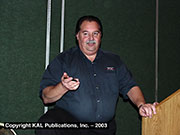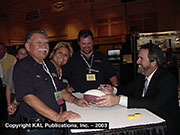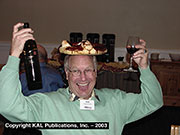
Southern California Petroleum Industry Golf and Tennis Tournament

CIOMA Regional Meeting

Western Petroleum Marketers Association Convention

Alliance Petroleum Meeting
Want to see the photos that didn't make the issue? Check out
the Cutting Room
Floor.
California
Leads the Way as Gasoline Street Prices Jump Over
$2.00 Per Gallon
Chevron to Sell Hawaii
Stations
Robber Shoots Chevron
Store Manager
Idaho Defeats Bill to Tax
Cigarettes
Thrifty to Pay $1.6 Million to
Orange County
LOS ANGELES, CA. — Gasoline street prices have jumped an "unprecedented" 45 cents per gallon in California in February and March, leading the way for gasoline to climb over $2.00 per gallon in much of the West.
The gasoline price increases in California were twice the national average over a six week time period from February to March. Even at the beginning of April, when gasoline prices are beginning to ease off in some areas, California has not followed suit. While gasoline prices have decreased 7% nationally since the start of the war with Iraq, prices in California have gone down only 2%.
While some have been quick to accuse oil companies, refineries and gasoline station owners of gouging, other voices point to the complex web of international pricing, concerns over the war with Iraq, transitions from winter blends to summer blends of gasoline and California’s shift to ethanol from MTBE causing short supply as major factors in gasoline price increases.
"Every time California’s gone into transition there have been problems with supply and price spikes," said Jay McKeeman, executive director for the California Independent Oil Marketers Association.
Supply and price spikes have affected California and all of its surrounding states. According to the AAA, the top five most expensive states to buy regular unleaded gasoline in early March were (in order) California, Nevada, Oregon, Washington, and Arizona.
California is required to sell oxygenated fuels — containing either MTBE or ethanol — by the Federal government to help clean up the state’s air. However, California Governor Gray Davis mandated that MTBE be removed from the station’s gasoline; 2003 is the year that California refineries must switch to ethanol from MTBE.
Many refineries have already completed that process, primarily in Northern California, and are marketing reformulated gasoline blended with ethanol. However, due to a ruling from the California Air Resources Board, gasoline containing MTBE and gasoline containing ethanol may only be mixed in a consumer’s tank. This factor is creating supply problems across the state as well as a ripple effect across the West.
In years past, as California moved from winter blends to summer blends in gasoline there have always been supply difficulties and shortages during the changeover time period — generally bringing a price spike in the Spring. This year, they are only worse because stations carrying ethanol blends can only look for product from ethanol blend refiners and stations carrying MTBE blends can only look for product from ethanol blend refiners. Supply, which had been short in the past, is now even shorter.
"Certainly, from our perspective, this has all the making of a very complicated fuel delivery process for the remainder of the year," said McKeeman. "You have two types of fuel in the system and that’s really the first time in a quite awhile that we’ve had a non-fungible fuel system in this state."
The conversion to ethanol has also decreased the amount of gasoline available. Because ethanol blends require greater amounts of crude to meet federal standards, in some cases fuel has been in short supply. The Lundberg Survey reported that the shift to ethanol cut California fuel supply by 10% as well as helping to keep the street prices moving upward.
Supply has been so short in the West, in fact, that terminals in Phoenix, Northern California, and Southern California have run out of fuel on several occasions in the past two months. Although the shortages generally lasted no longer than 24 hours, they were enough to keep jobbers and station owners concerned about product supply.
In addition, many unbranded customers in California, Arizona, and Washington have been cut off from their suppliers as the major oil companies worked to keep their own stations in fuel during turnarounds and shortages of reformulated gasoline components.
The fact that the switch to ethanol fuels would cost consumers more money is no surprise to the fuel industry or to the state government. California Governor Davis had initially slated the MTBE elimination to take place during 2002 — an election year. Davis moved the conversion date back one year after the California Energy Commission predicted that gasoline prices would jump 10 cents per gallon with the conversion to ethanol.
"California has always paid more for gasoline because of environmental regulations," said Economist Philip Verleger. "But the switch to these blends and short supply adds a premium to the cost and consumers are paying that premium every day."
Global uncertainty added to the mix. Crude oil prices soared as it became apparent that the United States would lead a coalition to war in the Middle East.
By mid-March, gasoline prices in Northern California — which has primarily converted to ethanol — were not only the highest gasoline prices in the nation but were also the highest prices recorded in that area. Every city in Northern California broke or reached the $2.00 barrier, according to AAA, with the average price in San Francisco at $2.24 per gallon for regular unleaded.
The same week, prices for regular unleaded in Hawaii averaged $1.95 per gallon on Oahu, $2.05 on Hawaii, and $2.20 in Maui, traditionally the highest priced retail gasoline in the United States given the high transportation costs involved with getting crude oil and gasoline to the Pacific Islands.
As prices soared, the backlash against the industry began increasing. Gallup reported in a poll for CNN and USA Today that two-thirds of Americans believed that price gouging was taking place.
The industry sought to inform the public of the supply and demand issues at play. The Petroleum Marketers Association of America noted in a letter to the AAA that the PMAA members "are as unhappy about the current high prices as you are. They have no control over the circumstances that create these high prices but, unfortunately, they get lambasted in the news media."
The American Petroleum Institute cited the fact that retail prices had risen penny for penny at the same rate as crude prices. They noted that it took two months for the crude price increases that took place to show up at the pump because of strong Fall inventories and the recession. Once the inventories were consumed, the effects of the high crude prices were seen by consumers. The API predicted that "it is unrealistic to expect gasoline or diesel prices to decline in any significant fashion."
The API noted that "Affordable crude will lead to affordable gasoline. If we want crude prices to stabilize we should be doing everything we can as a country to increase crude supply."
HONOLULU, HI. — Chevron has announced that they plan to sell all 61 of their remaining dealer-operated gasoline stations in Hawaii.
The stations are being offered to the dealers currently running them; prices for the stations vary depending on the site and the results of individual negotiations. If the dealers choose not to purchase the stations, Chevron says the current dealer-supplier relationship will continue.
Chevron will continue to supply the stations with its branded gasoline.
Chevron spokesman Albert Chee said that the major oil company decided to sell the stations because the locations were not selling enough gasoline to meet current Chevron standards and it was difficult to get acceptable rent levels from the smaller station sites.
"We now find if the individual operators own the assets, it is more efficient for them and it is more efficient for us," said Chee. "We get out of property management and the real estate business which is not our specialty."
Chee also said that Hawaii’s potential price-cap law — scheduled to take effect in 2004 — kept the major oil company from wanting to sign long-term leases with their dealers who were up for renewal.
Chevron dealer Barnaby Robinson said that he was "uncertain" if dealers were going to go ahead and purchase their station sites. "It all boils down to whether a site can support itself. A lot of dealers are going to be looking long and hard at their facilities." Robinson operates Chevron stations in Kahala and the Oahu Airport area.
Mike Kitagawa, a Chevron dealer on Maui, said that "given the right price I would very seriously consider buying it." Kitagawa added that as the owner of the site he believes he could expand the business.
Chevron will keep its nine company-operated locations in the Hawaiian islands as well as its refinery.
Chevron had closed four of its dealer stations earlier this year: three stations on Oahu and one on Hawaii.
VALLEJO, CA. — A thief shot a Chevron store manager in the stomach after the manager said he didn’t think the gun was real.
According to police reports, a man entered the Toll Bridge Chevron station, located on Lincoln Road West at 5:00 a.m. and asked for the store manager.
The clerk said the manager was in the back office and could not be disturbed. When the man started to walk toward the office, the clerk tried to stop him, saying, "You can’t go back there."
The thief replied, "Today’s our lucky day," and pushed a revolver into the clerk’s back and ordered him into the office. Once inside, the robber pointed the gun at both employees and demanded money.
When the manager, Aaron Woodall, 23, said that he didn’t believe the gun was real, the thief fired a round into his abdomen. Woodall fell backwards into a chair. The gunman grabbed an undisclosed amount of cash an
d ran out of the station.
Woodall was taken to a local hospital where he was listed in critical condition.FRUITA, CO. — Idaho legislators have defeated a bill to tax cigarettes sold on the state’s Indian reservations.
Idaho had looked to the tobacco tax legislation to increase the state’s revenues by placing a 28 cent-per-pack tax on cigarettes sold by Idaho tribes. Idaho state residents have been buying an increasing amount of their tobacco products from the tribes who are not required to levy Federal and state taxes on their cigarettes.
The five tribes living in Idaho all strongly opposed the legislation, claiming it was illegal for the state to levy a tax on items sold on Indian sovereign lands.
"There’s not any agency in this state that has a right to go on a reservation and enforce any laws against Native Americans," said Idaho Representative Richard Wills.
Representative Jim Clark said that the bill was a poor idea for raising funds for the state, "to impose taxes on another government. Let’s go impose a tax on the state of Washington."
Supporters of the bill said it would stop a drain on the state treasury from Idaho residents who are going to the reservations to stock up on lower-priced tobacco products.
Representative Lawrence Denney, who supported the bill, saying it was "Not a shot at the tribes and not a tax increase. It is an attempt to get those who should be paying to pay a tax."
SANTA ANA, CA. — Thrifty Oil has agreed to pay $1.6 million to settle a lawsuit filed by Southern California’s Orange County.
In addition, the oil company agreed to pay to clean up any contamination at their 43 stations in Orange County as well as pay for ongoing monitoring for potential leaks at the sites.
Orange County District Attorney Tony Kackauckas filed suit against Thrifty Oil claiming that the oil company contaminated groundwater in the County with MTBE. The suit charged that the contamination was caused by leaking underground storage tanks.
This settlement comes on the heels of a similar settlement between Orange County and Arco that was negotiated in December.
With the success of the suits against Thrifty and Arco, it is believe that similar suits will be filed against other oil companies in the near future.
Originally published in the April 2003 issue of
O&A Marketing News.
Copyright 2003 by KAL Publications Inc.
Serving the 13 Western States, the World's Largest Gasoline, Oil, Fuel, TBA and Automotive Service Market